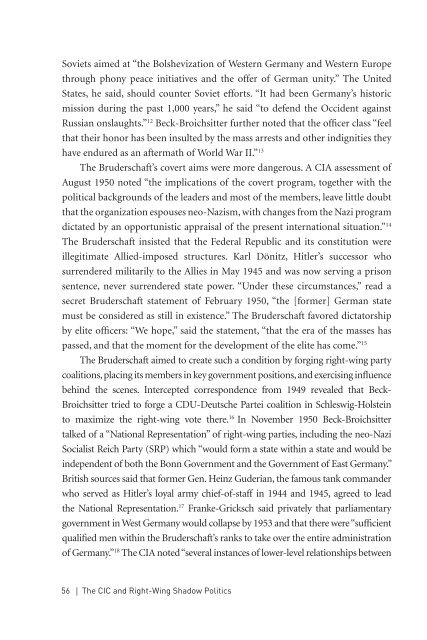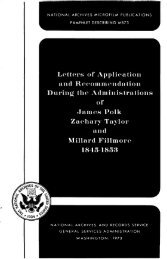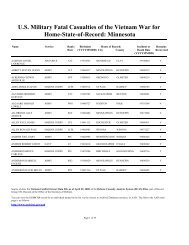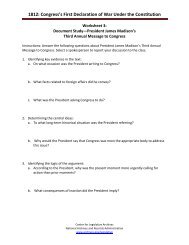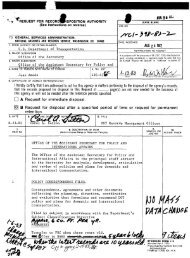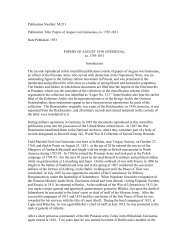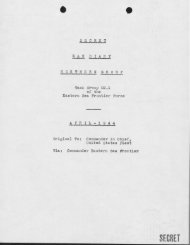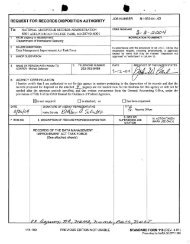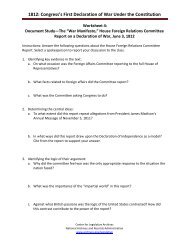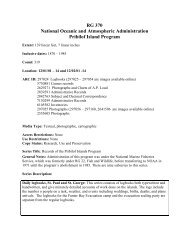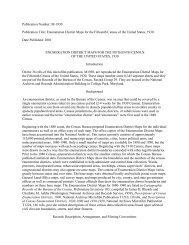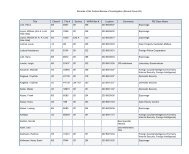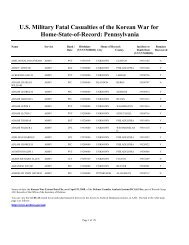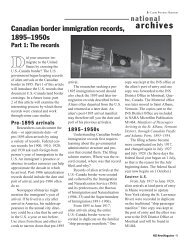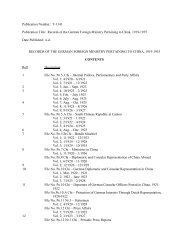HITLER'S SHADOW - National Archives and Records Administration
HITLER'S SHADOW - National Archives and Records Administration
HITLER'S SHADOW - National Archives and Records Administration
You also want an ePaper? Increase the reach of your titles
YUMPU automatically turns print PDFs into web optimized ePapers that Google loves.
Soviets aimed at “the Bolshevization of Western Germany <strong>and</strong> Western Europe<br />
through phony peace initiatives <strong>and</strong> the offer of German unity.” The United<br />
States, he said, should counter Soviet efforts. “It had been Germany’s historic<br />
mission during the past 1,000 years,” he said “to defend the Occident against<br />
Russian onslaughts.” 12 Beck-Broichsitter further noted that the officer class “feel<br />
that their honor has been insulted by the mass arrests <strong>and</strong> other indignities they<br />
have endured as an aftermath of World War II.” 13<br />
The Bruderschaft’s covert aims were more dangerous. A CIA assessment of<br />
August 1950 noted “the implications of the covert program, together with the<br />
political backgrounds of the leaders <strong>and</strong> most of the members, leave little doubt<br />
that the organization espouses neo-Nazism, with changes from the Nazi program<br />
dictated by an opportunistic appraisal of the present international situation.” 14<br />
The Bruderschaft insisted that the Federal Republic <strong>and</strong> its constitution were<br />
illegitimate Allied-imposed structures. Karl Dönitz, Hitler’s successor who<br />
surrendered militarily to the Allies in May 1945 <strong>and</strong> was now serving a prison<br />
sentence, never surrendered state power. “Under these circumstances,” read a<br />
secret Bruderschaft statement of February 1950, “the [former] German state<br />
must be considered as still in existence.” The Bruderschaft favored dictatorship<br />
by elite officers: “We hope,” said the statement, “that the era of the masses has<br />
passed, <strong>and</strong> that the moment for the development of the elite has come.” 15<br />
The Bruderschaft aimed to create such a condition by forging right-wing party<br />
coalitions, placing its members in key government positions, <strong>and</strong> exercising influence<br />
behind the scenes. Intercepted correspondence from 1949 revealed that Beck-<br />
Broichsitter tried to forge a CDU-Deutsche Partei coalition in Schleswig-Holstein<br />
to maximize the right-wing vote there. 16 In November 1950 Beck-Broichsitter<br />
talked of a “<strong>National</strong> Representation” of right-wing parties, including the neo-Nazi<br />
Socialist Reich Party (SRP) which “would form a state within a state <strong>and</strong> would be<br />
independent of both the Bonn Government <strong>and</strong> the Government of East Germany.”<br />
British sources said that former Gen. Heinz Guderian, the famous tank comm<strong>and</strong>er<br />
who served as Hitler’s loyal army chief-of-staff in 1944 <strong>and</strong> 1945, agreed to lead<br />
the <strong>National</strong> Representation. 17 Franke-Gricksch said privately that parliamentary<br />
government in West Germany would collapse by 1953 <strong>and</strong> that there were “sufficient<br />
qualified men within the Bruderschaft’s ranks to take over the entire administration<br />
of Germany.” 18 The CIA noted “several instances of lower-level relationships between<br />
56 | The CIC <strong>and</strong> Right-Wing Shadow Politics


